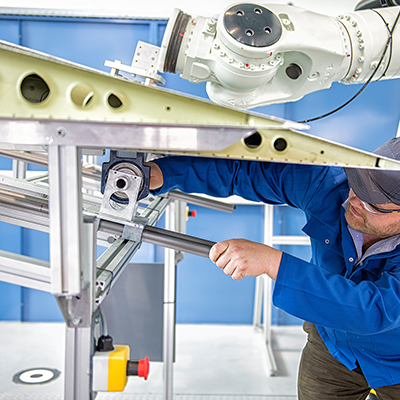- Dates1 October 2018–30 September 2022
- SponsorEuropean Union (Horizon 2020 project)
- Funded€7,939,022.50 (£7 million)
- PartnersLaboratory For Manufacturing Systems And Automation (Greece); Comau SPA (Italy); VDL Industrial Modules (Netherlands); United Technologies Research Centre (Ireland); Sofitec Aero SL (Spain); Fidia SPA (Italy); Pilz Industrieelektronik SL (Spain); Debbache-Lagios Ee – Gizelis Robotics (Greece); Intrasoft International SA (Luxemburg); Light & Shadows (France); Fundacion Tecnalia Research & Innovation (Spain); Fraunhofer-Institut Für Produktionsanlagen Und Konstruktionstechnik (Germany); University College Dublin (Ireland); MCI Benelux SA (Belgium)
The Industrial Psychology and Human Factors (IPHF) Group from Cranfield University is working with a team of 15 academic and industrial partners from 10 European countries to introduce the latest safe robotic technologies, including high payload collaborative arms, exoskeletons and mobile manipulators in diverse production environments. The multidisciplinary team brings together the technical knowledge in high payload collaborative robots, the dynamically reconfigurable safety monitoring systems, the smart human-robot interfaces, virtual and augmented reality tools for modelling, and expertise in industrial human factors and human-robot interaction. The IPHF Group continuously examines individual differences, human factors and physiological variables to ensure that any specific requirements of operator sub-groups are accounted for and are developing and applying methods for assessing impact of human-robot collaboration interfaces on the project industrial partner sites.
Further information
For further information about the project, please visit the SHERLOCK website.



